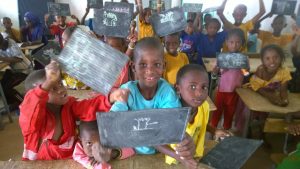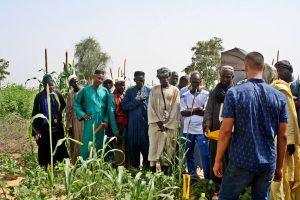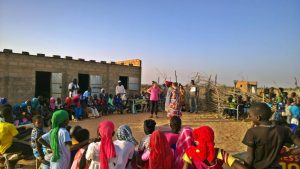This project is made possible through the partnership of WATER CHARITY and the NATIONAL PEACE CORPS ASSOCIATION. ![]()
Location
Diagaly, Communauté rurale Barkedji, Département Linguere, Region Louga, Senegal
 Community Description
Community Description
Diagaly is a small village in the Linguere Region of Senegal. It is 6 km from a major paved road and is home to about 3,000 residents. The community is strongly defined by its nomadic livestock herding history. Receiving between 190-350 mm of rain per year and daily temperatures reaching 110-115 degrees Fahrenheit on an average day during the months of March-June makes Diagaly a challenging place to live.
The village is made up of two ethnic groups, Wolof and Pulaars. The Pulaar ethnic group is traditionally Nomadic, and in many ways that makes them more vulnerable now. Their living situations often reflect the transient lifestyle they are known for. This often translates into less permanent living structures and reveals the unpredictability of the coming year as they see it.
The Wolof population generally lives in the more compact village center that is much more permanent than their Pulaar neighbors. This means they have more reliable access to water and to the market or small shops.
While the village is relatively remote, it serves as the economic hub for about 13 smaller, surrounding villages. Livestock and subsistence farming dominate the lifestyle. Despite the large population, there is only a public French elementary school and a Franco-Arab school that serves the 8-13-year-old range. After this, students will generally travel to nearby cities to continue their studies while living with friends or family during the school year.
 During the rainy season, there is a large influx of people who come to the farm or bring herds of cattle up from the south to take advantage of the grazing lands. Diagaly is also home to a Master Farm which is a Peace Corps/USAID project to create pilot farms to serve as educational centers and demonstrate new technologies. This serves the community of Diagaly and the surrounding villages as a place to learn, share, and acquire materials like seeds or vegetable transplants that were previously out of reach for more people. Inputs on multiple pieces of training a year and has opened doors to anyone interested in learning or discussing challenges.
During the rainy season, there is a large influx of people who come to the farm or bring herds of cattle up from the south to take advantage of the grazing lands. Diagaly is also home to a Master Farm which is a Peace Corps/USAID project to create pilot farms to serve as educational centers and demonstrate new technologies. This serves the community of Diagaly and the surrounding villages as a place to learn, share, and acquire materials like seeds or vegetable transplants that were previously out of reach for more people. Inputs on multiple pieces of training a year and has opened doors to anyone interested in learning or discussing challenges.
Problem Addressed
The Pulaar community has little in terms of permanent infrastructure, which can be traced to their traditional nomadic lifestyle. This part of the community is large, if not entirely, without access to latrines and continues the practice of walking out to the bush to relieve themselves. Children, in general, do not walk so far and relieve themselves just outside of the family compound. This has huge implications for health in the community and puts all at risk. With the extreme heat and arid conditions, diarrheal diseases associated with fecal contamination can quickly lead to dangerous dehydration and potentially death.
Currently, the main educational institutions of Diagaly do not have proper sanitation facilities. The Master Farm, the French School, and the Franco-Arab school are all held back because the people they serve must walk long distances to either find a latrine or to openly defecate nearby, which endangers others at the educational facilities. The lack of latrines also serves as a barrier to those using these educational facilities. It takes time away from learning as students and teachers leave class for extended periods to go to the bathroom.
 Project Description
Project Description
This Project will build sanitation facilities at the Master Farm and Franco-Arab school as well as return latrines at the French school to working order.
The Master Farm (which serves about 200 people a year) will build one latrine and one washing stall in the same structure that is connected to a basin.
The Franco-Arab School (which serves about 110 people, including teachers) will build two latrines in one structure that is connected to a single basin. They will also bring a water source to the school, which will include 200 m of piping, a water meter, and a water spout.
The French School (which serves about 250 people, including teachers) will replace 9 wood plank doors, 7 Turkish toilets, some cement repair to the stalls, and 15 m of piping to provide a water source to the latrines.
Each institution is responsible for managing its project. The parent associations of both the French School and Franco-Arab school will work closely with the PCV to create an action plan, hire the mason, acquire materials and oversee the work as it is executed. The pilot farmer from the Master Farm will work with the PCV to follow the same steps as the two schools.
Each institution will also install a Tippy Tap, which is a device made for washing hands. This will be built by a blacksmith in Diagaly and be showcased at these 3 visible locations to encourage washing hands and the spread of the technology.
In the month prior to and following building these facilities, Peace Corps Health Volunteers from the region will help put on training that sensitizes the community to the issue of open defecation and train each institution on proper maintenance for the latrines.
Project Impact
560 people will benefit from the project.
Peace Corps Volunteer Directing Project
Adam Keally
Monitoring and Maintenance
This project will include consistent Follow-up, as the PCV works closely with each institution. They will each elect a member of its organization to be responsible and accountable for the maintenance of the latrine. That person will receive training from the Peace Corps Health Volunteers and the mason on how to maintain a clean, functioning latrine.
Let Girls Learn
Girls are more widely affected by the lack of sanitation facilities, making it a bigger barrier to their education and equality in the long run. Having clean, functioning latrines with running water will help remove barriers that keep girls out of school. Girls are significantly more likely to drop out of school than boys in Diagaly, making it important to address the obstacles they face.
While this is not an official Let Girls Learn project, it does fall into Water Charity’s LGL+ grouping of projects that have a pronounced element involving helping girls go to, and stay in, school.
Fundraising Target
$1,200
Funds raised in excess of the project amount will be allocated to other projects in the country.
Donations Collected to Date
$1,200
Dollar Amount Needed
$0.00 – This project has been fully funded through the generosity of the G3 Foundation, of Costa Mesa, CA, USA.
Additional donations will be used for future projects in Senegal.
This project has been completed. To read about the conclusion, CLICK HERE.